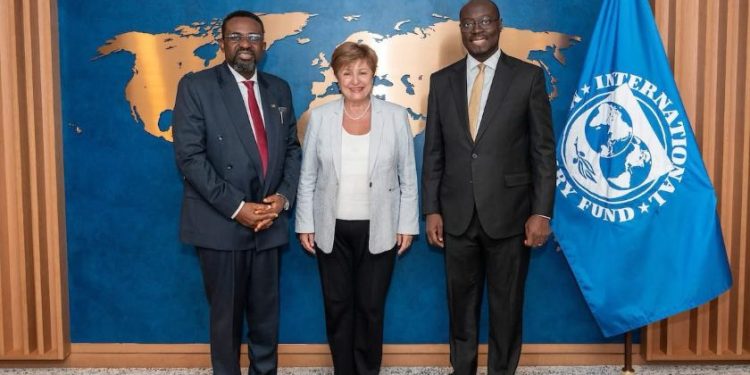- At the IMF/World Bank Meetings: Ghana’s Recovery Story Takes Centre Stage But the Hard Work Still Lies Ahead
The 2025 Annual Meetings of the International Monetary Fund (IMF) and the World Bank have opened at the institutions’ headquarters in Washington, DC, with Ghana’s delegation, led by Finance Minister Dr Cassiel Ato Forson and Dr Johnson Pandit Asiama, Governor of the Bank of Ghana, arriving with renewed optimism and global attention. This year’s meetings come at a pivotal moment for Ghana, following the IMF’s announcement of a staff-level agreement on the fifth review of the country’s three-year Extended Credit Facility (ECF) programme, which, once approved by the Fund’s Executive Board, will unlock US$385 million in new disbursements. For the first time in four years, Ghana’s macroeconomic story appears to have turned a corner: inflation has fallen into single digits, the cedi has rallied sharply, and international reserves have climbed past the US$10 billion mark, signs that have reignited confidence among investors and policymakers alike.
“Macroeconomic stabilisation is taking root,” said Ruben Atoyan, the IMF’s Mission Chief for Ghana. “Growth in the first half of 2025 was stronger than anticipated, underpinned by robust services activity and agricultural output.”
The IMF Verdict: Growth Anchored, But Risks Remain
The IMF’s fifth review under the US$3.2 billion programme finds that Ghana’s economy is “gaining momentum,” with growth projected at 4.8% in 2026, and inflation expected to stay within the Bank of Ghana’s (BoG) target band of 8 ± 2 percent.
Robust export performance, driven by gold, cocoa, and oil, has reinforced the cedi’s appreciation, while international reserves accumulation continues to exceed program targets. The Fund credited “sustained reforms, a favourable external environment, and improved investor confidence” as key drivers of this stability.
The primary fiscal balance, a key IMF performance metric, posted a surplus of 1.1% of GDP in the first eight months of 2025, putting Ghana on track to meet its 1.5% year-end target. Debt restructuring is also advancing: Ghana has signed a Memorandum of Understanding with the Official Creditor Committee under the G20 Common Framework, with bilateral deals already concluded with five countries and negotiations ongoing with commercial bondholders.
“Ghana’s debt trajectory improved markedly on an upgraded macroeconomic outlook and continued fiscal discipline,” the IMF statement noted, calling it “a significant step toward long-term debt sustainability.”
Still, the Fund cautioned that external risks remain, particularly commodity price volatility and the uncertain global outlook.
The Bank of Ghana’s Confidence Moment
Barely three days before the IMF announcement, Bank of Ghana Governor Dr. Johnson Pandit Asiama delivered what could be described as his most upbeat message yet to the banking sector.
At a post-MPC engagement with bank CEOs on October 7, the Governor declared that Ghana had “returned to single-digit inflation for the first time in four years,” with headline inflation falling to 9.4% in September, down from 54% in December 2022.
“Our growth momentum is equally strong,” he said. “The economy expanded by 6.3% in Q2 2025, with non-oil GDP growing by 7.8%, driven largely by services and agriculture. The cedi has appreciated 21% year-to-date, placing it among the best-performing currencies globally.”
Ghana’s trade surplus reached US$6.2 billion in the first eight months of the year, while international reserves climbed to US$10.7 billion, equivalent to 4.5 months of import cover. These are not trivial gains: they mark the highest level of external cover since 2019.
The central bank, in response, has embarked on a policy rate easing cycle—cutting the Monetary Policy Rate by 650 basis points in 2025 to 21.5%, following nine months of continuous disinflation.
“This is the third rate cut in 2025,” Asiama noted. “It reflects confidence that inflation will remain within the medium-term target band.”
Market Transmission and Banking Sector Strength
Monetary easing is already filtering through the system. Treasury bill rates have dropped from 13.4% in July to 10.3% in August, and average lending rates declined from 26.6% to 24.2% over the same period.
The Capital Adequacy Ratio of the banking sector now stands at 17.7%, while non-performing loans (NPLs) have improved to 20.8%, down from 23% earlier in the year. Although the figure remains high, the trend is positive.
Governor Asiama praised the industry’s resilience but issued a gentle warning:
“The return to single-digit inflation marks a new chapter in Ghana’s recovery—but it is not the end of the story. Our collective responsibility now is to sustain discipline, strengthen the financial system, and ensure that stability translates into jobs, affordable credit, and real growth.”
To reinforce confidence in market operations, the BoG announced it will commence foreign exchange (FX) intermediation under the Domestic Gold Purchase Programme (DGPP) starting October 2025. The plan involves selling up to US$1.15 billion in FX via twice-weekly price-competitive auctions, aimed at deepening the interbank market and smoothing volatility.
The Gold Factor: From Precious Metal to Policy Buffer
Behind the cedi’s strength lies a quieter story, one told not in currency markets but in vaults beneath the central bank.
According to the Bank of Ghana’s Gold Reserves Report for September 2025, total holdings have surged from 8.78 tonnes in May 2023 to a record 37.06 tonnes by end-September 2025, representing a more than fourfold increase in two years.
This rapid accumulation has been made possible by the Domestic Gold Purchase Programme, which allows the central bank to buy refined gold directly from local producers, thus converting domestic resources into foreign exchange buffers.
Economists say this policy has quietly transformed Ghana’s balance sheet strength.
“Gold has become Ghana’s new shield,” remarked one senior Treasury analyst. “It allows the BoG to accumulate reserves without external borrowing—an extraordinary feat in a post-default context.”
Indeed, the IMF report acknowledged that “international reserves accumulation continues to exceed program targets,” a testament to how the gold strategy has cushioned Ghana’s FX market and underpinned the cedi’s 21% appreciation.
Fiscal Tightrope: The 2026 Budget Challenge
While the monetary side looks increasingly stable, the fiscal front remains delicate. Ghana’s 2026 budget preparation guidelines, circulated in September, show an administration keen to balance ambition with austerity.
The Ministry of Finance directed all departments to base 2026 spending plans on actual expenditure from January to September 2025 and new needs “aligned to strategic and critical programs.” Importantly, it combines incremental budgeting with elements of zero-based budgeting, to ensure “realistic financial plans” and better cost control.
Departments have been instructed to anchor allocations on measurable returns, with an exchange rate assumption of GH¢17.00 to US$1—a cautious buffer against volatility. The Finance Ministry also underscored that public relations, IT infrastructure, utilities, and travel must be justified under clearly defined cost centres.
“The aim is to link every cedi spent to a tangible policy output,” a senior Finance Ministry source told NorvanReports. “We cannot afford another cycle of uncontrolled spending, especially with IMF targets watching closely.”
This aligns with the IMF’s call for “structural fiscal reforms to support adjustment, boost domestic revenues, and bolster the credibility of Ghana’s fiscal framework.”
The Energy Sector: From Reform to Reality
One of the IMF’s most notable commendations went to Ghana’s energy sector reforms, an area historically plagued by arrears and contractual inefficiencies.
The government, it said, had renegotiated legacy arrears and power purchasing agreements (PPAs) with most independent power producers (IPPs), instituted quarterly tariff adjustments, and expanded payments through the Cash Waterfall Mechanism.
These moves, combined with fiscal discipline, have restored some confidence among investors and helped reduce the fiscal drag of energy subsidies.
However, analysts warn that the real test will be implementation.
“The energy sector is where fiscal reforms either stand or collapse,” says economist Dr. Theo Acheampong. “If arrears re-emerge, the credibility of the entire IMF programme could be undermined.”
The BoG’s September Monetary Policy Committee (MPC) transcript echoed similar caution, highlighting that while disinflation and growth momentum are impressive, “risks remain significant, largely due to external shocks and domestic cost pressures.”
Financing Ghana’s 24-Hour Future
In a separate address at the “24-Hour Economy” Roundtable on September 18, Governor Asiama underscored how a stable banking system is central to Ghana’s economic transformation agenda.
“No nation has ever developed without an appreciable growth in the financial sector,” he said. “A safe and efficient payment system is essential to support day-to-day business and to settle transactions in financial markets.”
The Governor outlined how the central bank, through development finance institutions like DBG and GIRSAL, can expand long-term lending for manufacturing, agriculture, and energy, core pillars of the 24-hour policy initiative.
The policy aims to extend operating hours across critical sectors, from manufacturing to logistics, to boost productivity and employment. For BoG, the focus is on ensuring that monetary and financial stability translates into sustained access to credit and inclusion.
Beyond the Numbers: The Human Dimension
Behind the optimism, however, lies a sobering reality. For many Ghanaians, the feel-good macro headlines are yet to translate into relief at the micro level. Food prices, though stabilising, remain high in real terms. Access to affordable credit is still limited for SMEs.
Private sector credit growth, according to the BoG’s Summary of Economic and Financial Data for September 2025, has only recently turned positive at 1.7% in real terms, suggesting that monetary easing is just beginning to reach businesses.
Meanwhile, the banking sector’s elevated NPL ratio reflects persistent repayment challenges in agriculture, construction, and commerce, the very sectors expected to drive the 24-hour policy transformation.
Investor Confidence and the Path to Ratings Repair
Global markets have responded positively to Ghana’s progress. The cedi’s appreciation and reserve buildup have boosted investor sentiment, while the successful conclusion of bilateral debt agreements has narrowed sovereign spreads.
Fitch recently signalled that Ghana’s credit outlook could move from “restricted default” to “stable” once commercial debt negotiations conclude, a development that would reopen access to international capital markets.
The Road Ahead: Stability Is Not the Destination
Ghana’s recovery story, impressive as it is, remains fragile. The IMF’s upcoming Board review will likely endorse the progress, but the sustainability of these gains will depend on discipline, political, fiscal, and institutional.
Governor Asiama, closing his October MPC press conference remarks, perhaps captured this balance best:
“Our collective responsibility now is to ensure that stability translates into jobs, affordable credit, and real growth for households and businesses.”
The message is clear: macro stability may be back, but resilience will only come when it is felt in the wallets of ordinary Ghanaians.
At a Glance: Ghana’s Macro Indicators (September 2025)
| Indicator | Latest Value | Trend |
| Headline Inflation | 9.4% | Downward (9th consecutive month) |
| Policy Rate | 21.5% | Eased 650bps in 2025 |
| GDP Growth (Q2 2025) | 6.3% | Strong momentum |
| Cedi (USD/GHS) | 12.15 | 21% YTD appreciation |
| Gross Reserves | US$10.73bn | 4.5 months import cover |
| Gold Reserves | 37.06 tonnes | +320% since May 2023 |
| Primary Fiscal Balance | 1.1% of GDP (surplus) | On track for 1.5% |
| NPL Ratio | 20.8% | Improving |
| Capital Adequacy | 17.7% | Above regulatory minimum |
Conclusion:
Ghana’s return to single-digit inflation and rising reserves mark a symbolic recovery milestone. The IMF’s endorsement cements that progress—but the real victory will lie in translating macro stability into inclusive growth, productive credit, and investor trust that endures beyond the next review cycle.
Stay with NorvanReports for exclusive, on-the-ground coverage from Washington, DC, as we bring you in-depth updates, expert interviews, and all the key developments shaping Ghana and Africa’s voice at the 2025 IMF/World Bank Annual Meetings.








